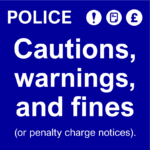Search Result
Metropolitan Police Service
Police warnings, cautions and fines
 Under the heading, "How do the police deal with minor crimes?" POLICE.UK says:
Under the heading, "How do the police deal with minor crimes?" POLICE.UK says:
"The police can decide to deal with a minor crime by giving:
-
- a caution or warning
- a police fine, called a penalty notice
- a community resolution
The victim sometimes agrees to accept an apology if it's a minor incident."
Though true, this is an over-simplification as these actions are recorded locally and/ or on the Police National Computer (PNC) and may have serious implications for you further down the line.
For example:
- You have to admit an offence and agree to be cautioned
- You can be arrested and charged if you don't agree
- While a caution is not a criminal conviction, it could be used as evidence of 'bad character' if you go to court for another crime
- Cautions can show on standard and enhanced Disclosure and Barring Service (DBS) checks
If a person decides not to accept the caution the police officer must
- Ensure that they understand that they do not need to make an immediate decision (they could go away and think about it)
- Ensure that they have had the opportunity of receiving free and independent legal advice
- Confirm they consent to receiving the caution in which case they must sign a form confirming so, a copy of which they can take away with them
Bottom line: get legal advice wherever/ whenever you can before agreeing to or signing anything.
Your criminal record | Nacro
Police caution | Wikipedia
Everything you need to know about police cautions | Bindmans
Police cautions, warnings and penalty notices | GOV.UK
How long does a police caution stay on your record? | policecautions.uk
